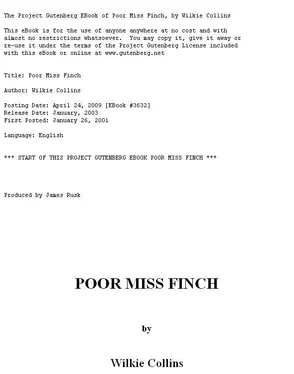Уилки Коллинз - Poor Miss Finch
Здесь есть возможность читать онлайн «Уилки Коллинз - Poor Miss Finch» весь текст электронной книги совершенно бесплатно (целиком полную версию без сокращений). В некоторых случаях можно слушать аудио, скачать через торрент в формате fb2 и присутствует краткое содержание. Год выпуска: 2002, Жанр: Классическая проза, на английском языке. Описание произведения, (предисловие) а так же отзывы посетителей доступны на портале библиотеки ЛибКат.
- Название:Poor Miss Finch
- Автор:
- Жанр:
- Год:2002
- ISBN:нет данных
- Рейтинг книги:3 / 5. Голосов: 1
-
Избранное:Добавить в избранное
- Отзывы:
-
Ваша оценка:
- 60
- 1
- 2
- 3
- 4
- 5
Poor Miss Finch: краткое содержание, описание и аннотация
Предлагаем к чтению аннотацию, описание, краткое содержание или предисловие (зависит от того, что написал сам автор книги «Poor Miss Finch»). Если вы не нашли необходимую информацию о книге — напишите в комментариях, мы постараемся отыскать её.
Poor Miss Finch — читать онлайн бесплатно полную книгу (весь текст) целиком
Ниже представлен текст книги, разбитый по страницам. Система сохранения места последней прочитанной страницы, позволяет с удобством читать онлайн бесплатно книгу «Poor Miss Finch», без необходимости каждый раз заново искать на чём Вы остановились. Поставьте закладку, и сможете в любой момент перейти на страницу, на которой закончили чтение.
Интервал:
Закладка:
The trial occupied two days.
No new facts of importance were discovered in the interval. The evidence followed the course which it had taken at the preliminary examinations—with this difference only, that it was more carefully sifted. Mr. Dubourg had the double advantage of securing the services of the leading barrister on the circuit, and of moving the irrepressible sympathies of the jury, shocked at his position and eager for proof of his innocence. By the end of the first day, the evidence had told against him with such irresistible force, that his own counsel despaired of the result. When the prisoner took his place in the dock on the second day, there was but one conviction in the minds of the people in court—everybody said, "The clock will hang him."
It was nearly two in the afternoon; and the proceedings were on the point of being adjourned for half an hour, when the attorney for the prisoner was seen to hand a paper to the counsel for the defense.
The counsel rose, showing signs of agitation which roused the curiosity of the audience. He demanded the immediate hearing of a new witness; whose evidence in the prisoner's favor he declared to be too important to be delayed for a single moment. After a short colloquy between the judge and the banisters on either side, the court decided to continue the sitting.
The witness, appearing in the box, proved to be a young woman, in delicate health. On the evening when the prisoner had paid his visit to the lady, she was in that lady's service as housemaid. The day after, she had been permitted (by previous arrangement with her mistress) to take a week's holiday, and to go on a visit to her parents, in the west of Cornwall. While there, she had fallen ill, and had not been strong enough since to return to her employment. Having given this preliminary account of herself, the housemaid then stated the following extraordinary particulars in relation to her mistress's clock.
On the morning of the day when Mr. Dubourg had called at the house, she had been cleaning the mantelpiece. She had rubbed the part of it which was under the clock with her duster, had accidentally struck the pendulum, and had stopped it. Having once before done this, she had been severely reproved. Fearing that a repetition of the offense, only the day after the clock had been regulated by the maker, might lead perhaps to the withdrawal of her leave of absence, she had determined to put matters right again, if possible, by herself.
After poking under the clock in the dark, and failing to set the pendulum going again properly in that way, she next attempted to lift the clock, and give it a shake. It was set in a marble case, with a bronze figure on the top; and it was so heavy that she was obliged to hunt for something which she could use as a lever. The thing proved to be not easy to find on the spur of the moment. Having at last laid her hand on what she wanted, she contrived so to lift the clock a few inches and drop it again on the mantelpiece, as to set it going once more.
The next necessity was of course to move the hands on. Here again she was met by an obstacle. There was a difficulty in opening the glass-case which protected the dial. After uselessly searching for some instrument to help her, she got from the footman (without telling him what she wanted it for) a small chisel. With this, she opened the case—after accidentally scratching the brass frame of it—and set the hands of the clock by guess. She was flurried at the time; fearing that her mistress would discover her. Later in the day, she found that she had over-estimated the interval of time that had passed while she was trying to put the clock right. She had, in fact, set it exactly a quarter of an hour too fast.
No safe opportunity of secretly putting the clock right again had occurred, until the last thing at night. She had then moved the hands back to the right time. At the hour of the evening when Mr. Dubourg had called on her mistress, she positively swore that the clock was a quarter of an hour too fast. It had pointed, as her mistress had declared, to twenty-five minutes to nine—the right time then being, as Mr. Dubourg had asserted, twenty minutes past eight.
Questioned why she had refrained from giving this extraordinary evidence at the inquiry before the magistrate, she declared that in the remote Cornish village to which she had gone the next day, and in which her illness had detained her from that time, nobody had heard of the inquiry or the trial. She would not have been then present to state the vitally important circumstances to which she had just sworn, if the prisoner's twin-brother had not found her out on the previous day—had not questioned her if she knew anything about the clock—and had not (hearing what she had to tell) insisted on her taking the journey with him to the court the next morning.
This evidence virtually decided the trial. There was a great burst of relief in the crowded assembly when the woman's statement had come to an end.
She was closely cross-examined as a matter of course. Her character was inquired into; corroborative evidence (relating to the chisel and the scratches on the frame) was sought for and was obtained. The end of it was that, at a late hour on the second evening, the jury acquitted the prisoner, without leaving their box. It was not too much to say that his life had been saved by his brother. His brother alone had persisted, from first to last, in obstinately disbelieving the clock—for no better reason than that the clock was the witness which asserted the prisoner's guilt! He had worried everybody with incessant inquiries—he had discovered the absence of the housemaid, after the trial had begun—and he had started off to interrogate the girl, knowing nothing, and suspecting nothing; simply determined to persist in the one everlasting question with which he persecuted everybody belonging to the house: "The clock is going to hang my brother; can you tell me anything about the clock?"
Four months later, the mystery of the crime was cleared up. One of the disreputable companions of the murdered man confessed on his death-bed that he had done the deed. There was nothing interesting or remarkable in the circumstances. Chance which had put innocence in peril, had offered impunity to guilt. An infamous woman; a jealous quarrel; and an absence at the moment of witnesses on the spot—these were really the commonplace materials which had composed the tragedy of Pardon's Piece.
CHAPTER THE NINTH
The Hero of the Trial
"You have forced it out of me. Now you have had your way, never mind my feelings—Go!"
Those were the first words the Hero of the Trial said to me, when he was able to speak again! He withdrew with a curious sullen resignation to the farther end of the room. There he stood looking at me, as a man might have looked who carried some contagion about him, and who wished to preserve a healthy fellow-creature from the peril of touching him.
"Why should I go?" I asked.
"You are a bold woman," he said, "to remain in the same room with a man who has been pointed at as a murderer, and who has been tried for his life."
The same unhealthy state of mind which had brought him to Dimchurch, and which had led him to speak to me as he had spoken on the previous evening, was, as I understood it, now irritating him against me as a person who had made his own quick temper the means of entrapping him into letting out the truth. How was I to deal with a man in this condition? I decided to perform the feat which you call in England, "taking the bull by the horns."
"I see but one man here," I said. "A man honorably acquitted of a crime which he was incapable of committing. A man who deserves my interest, and claims my sympathy. Shake hands, Mr. Dubourg."
Читать дальшеИнтервал:
Закладка:
Похожие книги на «Poor Miss Finch»
Представляем Вашему вниманию похожие книги на «Poor Miss Finch» списком для выбора. Мы отобрали схожую по названию и смыслу литературу в надежде предоставить читателям больше вариантов отыскать новые, интересные, ещё непрочитанные произведения.
Обсуждение, отзывы о книге «Poor Miss Finch» и просто собственные мнения читателей. Оставьте ваши комментарии, напишите, что Вы думаете о произведении, его смысле или главных героях. Укажите что конкретно понравилось, а что нет, и почему Вы так считаете.






